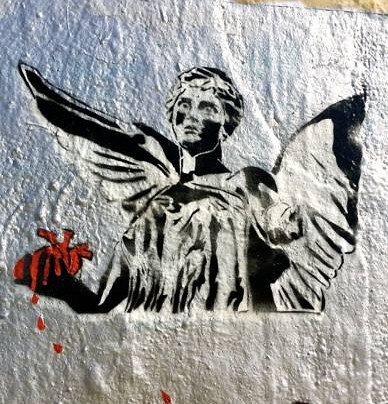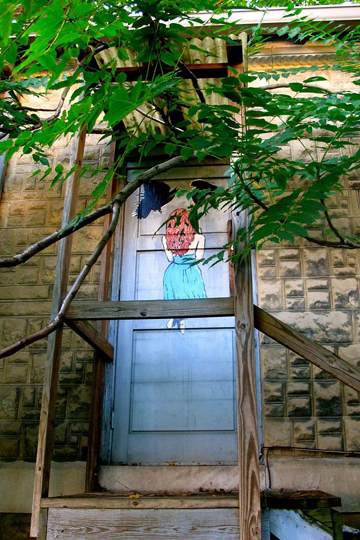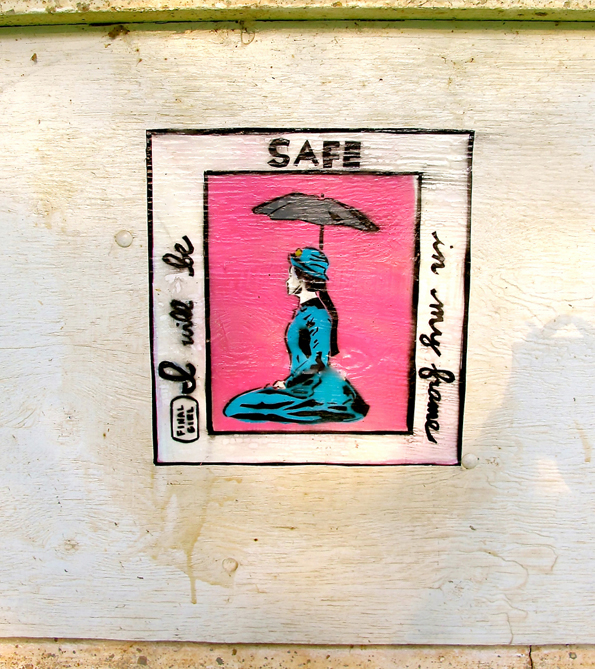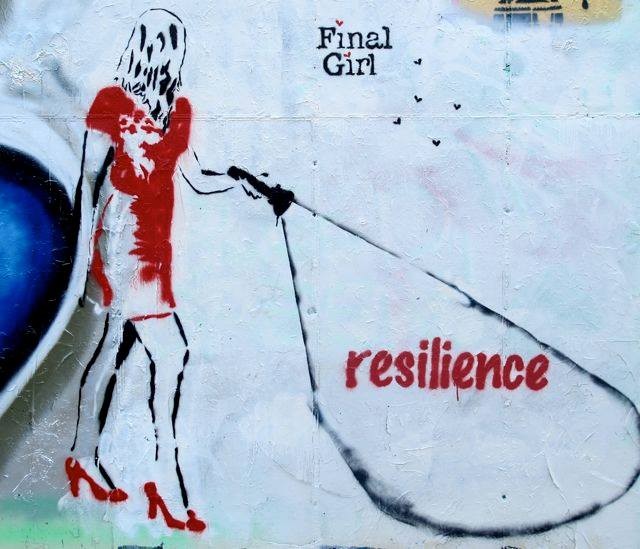
Illustration by FINAL GIRL, anonymous street artist
Damn kids! That’s what Ed yells. I say, they’re just boys, but my voice fails to rise to an equal timbre. Boys making noise, he roars. I tell him, it’s music. That’s music! Stop being a fuddy-duddy. Do you want me to tell them? Fine, I’ll talk to them, I say.
Our son plays in a rock and roll band. Okay, not a real rock and roll band – a garage band, currently our garage, with two of his high school buddies. It’s ten to ten on a Saturday night. We live in suburbia. So maybe they should think about wrapping it up.
I stand for a moment on the back deck to settle my breathing. From here I see a corner of the open garage where a shaft of white light angles onto the driveway. Tim’s best friend plays guitar. Head down, dirty blond hair spills over his shoulders, hiding his face. He doesn’t shift his gaze from the concrete floor to make eye contact with the three girls huddled by the front bumper of our aging minivan– high school groupies crooning for my son and his band. I recognize two of the girls, not the third.
I move to the shadow of the willow tree where I can see now Tim in front of the drum kit strumming his bass. I recognize the Kiss cover tune. How could I not? It’s one of the few tunes they know. Tim practices the bass line relentlessly when he’s home. God of Thunder. Eventually, I picked up the lyrics. Tim sings:
“You’ve got some-thin’ a-bout you.
“You’ve got some-thin’ I need.”
Tim’s voice has not fully developed. He wants to sing with a deep basal tone, but the words come out sounding pinched. I stifle a smile, fold my arms, and admire my son’s thick, curly black hair. His hair – it explodes like a supernova. Hair any woman would envy. Tim sings:
“Daugh-ter of Aph-ro-di-te.
“Hear my words and take heed.”
The one girl – the girl I don’t know – I see her better now. I see how she watches my son. She appears more mature than the other girls. Physically, yes – her breasts are fully formed, accentuated by a white sweater. But there’s something else – the way she stands, confident. If I had to guess, I’d say she’s smart, one of the smartest kids in school. She already has her career planned, I’m sure. She knows what she wants out of life.
I don’t think Tim knows what he wants out of life, and I think it’s better that way. How can you possibly know what you want at that age? He enjoys playing rock and roll and eventually his voice will mature. If he wants to be a rock and roller, I’m okay with that, so long as he’s happy. He sings:
“God of thun-der – and rock and roll.
“The spell you’re un-der.
“Will slow-ly rob you of your vir-gin soul.”
A heavy bass line kicks in here as Tim’s voice fades away from the microphone, like he’s falling down a deep well. That line – rob you of your virgin soul – bothers me. I don’t know if my son is a virgin. I know Tim and his father have had that talk. I don’t know if his father knows. I don’t know if I want to know. But by the way Tim looks at the one girl, I think I can figure it myself.
They finish the song. The three girls applaud. Two of the girls squeal, but that third girl, she just claps quietly, her eyes lock on my son; she smiles with beautiful white teeth. In the moonlight, her straight brunette hair cascades over her shoulders like a dark waterfall. I smell lilacs, or maybe it’s her perfume.
I step out of the shadows onto the driveway, clapping and calling Tim’s name. Nobody seems startled by my presence, except for Tim’s best friend, the guitarist. Always shy, he waves, and says, “Hi Mrs. Miller.”
Tim leans his black bass against the garage. As he walks toward me, my heart flutters. His steps are like royalty. In the past year, he’s grown taller than me. “What’s up?” he says.
Words catch in my throat. He’s beautiful. My son. He is. A god. A rock and roll god. Smooth skin. Not even a trace of razor stubble. And all the kindness in the world buried in those soft, brown eyes. I want to throw my arms around his neck. Hold him against me. Kiss his cheek and never let him go.
“Who’s the girl?” I say.
“Jennifer?”
“The brunette?”
He glances back at her, smiles at me, and I know. “She’s a friend,” he says.
I want to touch him. I want to reach out and grab his hand and hold it between both of mine close to my heart. But I say, “It’s getting late.”
“That was our last song. Don’t want to keep Dad up.” He smirks. He knows. There are a lot of things he knows now. A lot of things I wish he didn’t know. He knows he and his father don’t see eye-to-eye. They seem more to tolerate each other. They’ve given up trying to form a bond. That realization makes me want to cry. But more, I think he knows his father and I have fallen out of love. That’s something I always wanted to shelter him from.
He tells me he and his friends are going out. I tell him to be home by midnight and ask where they’re going. He says to Jennifer’s house. Her parents have a finished basement with a pool table. We have a basement with a workshop and power tools. He tells me they’re walking two blocks to Jennifer’s house. New to the school, she just moved to the neighborhood. This fact both surprises and calms me, knowing that my son will be close.
Tim punches the code onto the keypad and the garage door rattles and begins to drop. As a group, they move down the sidewalk, passing beneath an amber streetlight before disappearing into darkness, my son and Jennifer lagging behind amongst the whisper of cicadas.
~
Inside, a dull quietness fills the house. The only light comes from a lamp beside the recliner in the living room. Beside the chair, an empty whiskey glass. I pour a glass of Merlot and return to the back deck to sit and listen to the cicadas – the remaining audience to my son’s rock and roll show.
At one time, I thought I knew what I wanted, just like Jennifer – eighteen, nine months before Tim would arrive on the scene, when his future father pulled into my parents’ driveway to pick me up in his dad’s Ford pickup truck. His dad had built a plywood camper into the truck bed, for hunting. If my parents had seen the vehicle, they probably wouldn’t have allowed me to go. All they knew is that we were going to see Journey in concert.
But what they didn’t know – we didn’t go directly to the show. We took a back road into the state land and parked. We crawled into that makeshift camper and made love on a thin mattress over a plywood bed. Everything smelled of freshly cut wood – even Tim’s father. We rolled around on that creaky plywood bed, taking turns on top of each other. At the time, that’s all I wanted. Him. Ed.
Afterwards, we left state land and found our way to the highway. Music blaring, I pressed myself against Ed, one arm around his shoulder, the other hand in his lap. We talked about I don’t know what. We laughed about stuff – I can’t remember what – and Tim’s father drove fast, with one hand on the wheel and the other rubbing my thigh, so roughly he rubbed my leg it later left a purple bruise. We followed our headlights down a black highway.
When we arrived in the parking lot and exited the truck, Ed stood dumbfounded staring at the empty truck bed. The plywood camper, we learned later, had never been properly secured. At high speeds on the highway, it must have blown off somewhere. We had never known. Never heard it rip from the back bed and crash onto the road.
I started to laugh, and then Ed laughed, and we hugged each other and kissed and laughed some more until we had tears in our eyes, because nothing really seemed to matter at that time, nothing seemed more important than the two of us.
~
I finish my glass of wine, and I’m nearly lulled to sleep by the relentless cicadas when the door to the deck slides open and Ed steps out. He wears powder blue pajama bottoms and a white tee shirt. His hair is disheveled and he needs a shave. He sits in the chair next to me. He’s barefoot. “What?” he says, noticing I’m staring.
“I was just coming to bed,” I say. “I was listening to the cicadas.”
He grunts, scratches his inner thigh, and peers at the half moon hung over the neighbor’s roof. His face, I notice it more now – heavier, more full, weightier, yes, but something else. His face, it seems, carries a quiet anger. “Tim in bed?”
“He’s with his girlfriend,” I say.
His expression doesn’t change. “He has a girlfriend?”
“I think,” I say. “Her name is Jennifer. She just moved to the neighborhood. That’s where they are – her basement playing pool with friends.”
“Oh.” He leans back and rests his palms on his thighs. Ed’s hands look too large for his body – big and beefy with fingers like sausage links. I know, I’m pretty sure, his work causes his hands to swell – the constant drilling, hammering, pounding. Ed’s a hard worker – that I’ve never doubted. He massages his right hand between the thumb and pointer finger. I catch him doing this more often, and this time, now, for the first time, I take his hand in mine and continue the gentle massage with my thumb. Ed turns toward me, appearing sleepier than surprised, then looks back at the moon.
“Remember that plywood camper of your dad’s?” I say.
Ed chortles, though it sounds more like a grunt. “Whatever made you think of that?”
I set Ed’s hand in my lap and cover it with my own. “I just was,” I say.
His hand stays motionless like a dumb, cold brick while I rub his knuckles with the tips of my fingers. Sometimes, I think I try too hard. Sometimes, I think I’m trying more for Tim than for myself. Then, he says, “A girlfriend, huh.”
I say, “Yep.”
“Hmm,” and I feel his fingers move in my lap, ever-so slightly, like life awakening.
The cicadas sing louder. The moon shines brighter behind a vapory veil. My heart, I feel it beating. I feel it beating so fast and heavy, I feel it breaking.
~
When Ed sleeps on his back, he snores. When he has one too many highballs, he snores, and after sex, he snores. Tonight, he’s got two of three going for him. As I ease out of bed, the digital clock on the nightstand reads 3:10. I pull on a pair of sweatpants and nightshirt, and carefully close the bedroom door behind me.
After using the toilet, I gingerly step down the carpeted hallway to peer into Tim’s room. Curled in the fetal position he looks suddenly small to me. Then, in the moonlight splashed across his bed, I see that’s not my son! A stranger sleeps in his bed. I take a step closer, holding my breath, and realize it’s Jennifer. But no Tim.
In the living room I find Tim sprawled on the couch. He sleeps on his stomach, one arm hanging over the side, his knuckles on the carpet. His bare back, I have to look closely to witness the gentle rise and fall of his quiet breathing. His bare back, it captivates me in the moonlight-filled room, its eloquent grace.
In the kitchen I turn on the light over the sink, take a cup from the cupboard, and as I’m rinsing out the inside I hear my name. “Hello, Mrs. Miller.” I spin quickly around and discover Jennifer standing in the doorway.
She wears the same clothes she wore earlier in the night. They look slept-in. The end of her hair frizzes with static electricity. She’s hugging herself, her arms crossed over her chest. “Sorry. Didn’t mean to scare you.”
“I just wasn’t expecting someone,” I say. Then to clarify, I say, “I wasn’t expecting to see you.”
Jennifer takes a seat at the kitchen table, and she appears to me now much less confident and self-assured as she appeared standing in my driveway watching my son’s rock and roll band. I stand by the table, cradling the empty cup in the palm of my hand. “What are you doing here?”
She hugs herself tighter. Looking first at the floor and then to me, she says, “My parents, they argue a lot.”
“Oh,” I say, because I don’t know what else to say.
“Tim said it would be okay for me to spend the night.”
“I guess that’s alright,” I say. “Would you like some hot cocoa? I was just going to make some.”
“That would be very nice. Thank you.”
I fill the cup with water and place it into the microwave to heat. I feel a strange sense of anticipation in this rather intimate opportunity to speak with and get to know this girl so smitten with my son. I stir cocoa into the hot water, and when I turn back, Tim stands in the doorway wearing only his checkered boxer shorts.
I must have gasped, for even Jennifer glanced my way before returning her gaze to Tim. My son. He is. Beautiful. He is. A god. He crosses the kitchen, and their eyes never part. He places his hand on the back of her neck. My son, he has a look of supremacy, but not arrogance. He shows mercy and great tenderness. Jennifer, she sits peering up at him like the supplicant servant.
I’m not sure how to decipher this scene. I’m overwhelmed with pride for my son, yet with Jennifer, I fear for her well being. Not that Tim would ever intentionally hurt her. But I’m wondering – is this love I’m seeing before me, or something else? And if it is love, are they ready for it?
I place the steaming cup of cocoa on the table in front of Jennifer and take a seat opposite her. As I begin talking, Tim remains standing by Jennifer’s side. I find this disconcerting, so I tell him to sit down, which he does. I ask Jennifer if her parents know where she is. She hesitates then shakes her head. I tell them I don’t want anybody staying overnight at my house without permission. I tell Jennifer she is to call her parents first thing in the morning. I tell her I want her home phone number, too. “What if they’ve called the police?” I say.
Jennifer shakes her head again, looks me directly in the eye. A sense of surrender surrounds her. “They won’t call the police,” she says.
Tim reaches across the table to hold Jennifer’s hand. I want to cry, but I’m able to maintain my composure. “You’re sleeping on the couch,” I say, and I realize my tone and inflection makes it sound more like a question than the command intended. Nonetheless, Tim nods.
We continue sitting and talking. Mostly, I ask questions. Jennifer shares a little about her parents. They don’t sound like bad people or bad parents. They sound like a married couple that argues from time to time. Jennifer and Tim – they’re at that age of hypersensitivity to the world around them. They don’t understand love. Love is not always a given, and it’s not always the Holy Grail. It’s not always constant in its intensity. That thought – love is not always constant in its intensity – makes me pause, and an awkward silence ensues.
Yes, of course.
As Jennifer finishes the last of her hot cocoa, I realize I never made a cup for myself. Strange, but I suddenly feel like the uninvited guest in my own kitchen. I remind Tim again about staying on the couch. I tell them both to get some sleep. I’m tired, too, but I know I won’t sleep. In another hour, dawn will break.
I exit the kitchen and then hesitate in the hallway leaving the two of them alone. But I have to trust them.
In the bedroom, Ed now sleeps on his side; a hollow wheezing has replaced the rancorous snoring. As I ease under the covers, the wheezing stops and I know I’ve woken him. My mind – it flits back to that wild ride from the state land to the concert, the highway mile markers appearing in the truck headlight beams then disappearing in the dark in endless succession. Our life seems to have been that way ever since. Non-stop. How I wish we could slow down. How I wish, at times, we could even turn around. Go back. I curl up behind Ed and press my nose against his neck. Ed reaches back and rests his hand on my knee. His thumb stirs the delicious scent of plywood.
Brian Kamsoke has fiction forthcoming in New Plains Review and Night Train. His other work has appeared in FICTION, Almost Five Quarterly, REAL: Regarding Arts & Letters, Reed Magazine, Pearl, and the Flint Hills Review. He received his MFA from Wichita State University where he was awarded the 2012-2013 Creative Writing Fellowship. He’s currently putting the finishing touches on a travel memoir while continuing work on that damn novel. This is his second installment in r.kv.r.y. quarterly.























